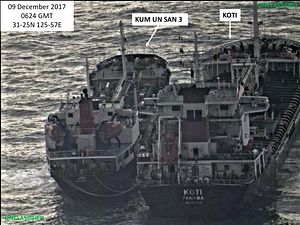On Friday, the U.S. Treasury announced a new round of unilateral sanctions against North Korea. In a statement, the Treasury Department described the package as the “largest North Korea-related sanctions tranche to date.” The announcement emphasizes that the United States continues to adhere to its stated policy of “maximum pressure” on North Korea, even as North and South Korea have seen limited diplomatic progress over the course of the last month, following the visit of a high-level North Korean delegation to Seoul at the start of the PyeongChang Winter Olympics.
The sanctions focus on making sea-based illicit trade in violation of United Nations Security Council resolutions more difficult for North Korea. The new sanctions designate “one individual, 27 entities, and 28 vessels located, registered, or flagged in North Korea, China, Singapore, Taiwan, Hong Kong, Marshall Islands, Tanzania, Panama, and Comoros,” according to the Treasury release.
“Treasury is aggressively targeting all illicit avenues used by North Korea to evade sanctions, including taking decisive action to block the vessels, shipping companies, and entities across the globe that work on North Korea’s behalf. This will significantly hinder the Kim regime’s capacity to conduct evasive maritime activities that facilitate illicit coal and fuel transports, and erode its abilities to ship goods through international waters,” said Treasury Secretary Steven Mnuchin.
“The President has made it clear to companies worldwide that if they choose to help fund North Korea’s nuclear ambitions, they will not do business with the United States,” Mnuchin added.
On top of the new sanctions, the U.S. Treasury Department’s Office of Foreign Assets Control (OFAC) issued a global shipping advisory, in conjunction with the United States Department of State and the U.S. Coast Guard. The advisory lists a range of “deceptive shipping practices” used by North Korea to bypass international sanctions.
“Parties subject to U.S. and/or United Nations (UN) sanctions should be aware of these practices in order to implement appropriate controls to ensure compliance with their legal requirements,” the advisory notes. The advisory includes a list of North Korean vessels that the United States believes are capable of engaging in ship-to-ship transfers of petroleum in violation of UN sanctions. The Treasury sanctions announcement, like an announcement last November, includes unclassified imagery to demonstrate illicit ship-to-ship transfers.
In 2017, the United Nations Security Council unilaterally approved three new resolutions—2371, 2375, and 2379. Among other provisions, the three resolutions expanded restrictions on North Korea’s exports and imports, adding asset freezes on North Korean entities, and requiring UN member states to seize and impound vessels smuggling restricted commodities to North Korea (including oil and coal).
Resolutions 2371 and 2379 were adopted after North Korea’s first tests of the Hwasong-14 and Hwasong-15 intercontinental-range ballistic missiles, and 2375 was adopted after the country’s sixth nuclear test in September 2017.

































